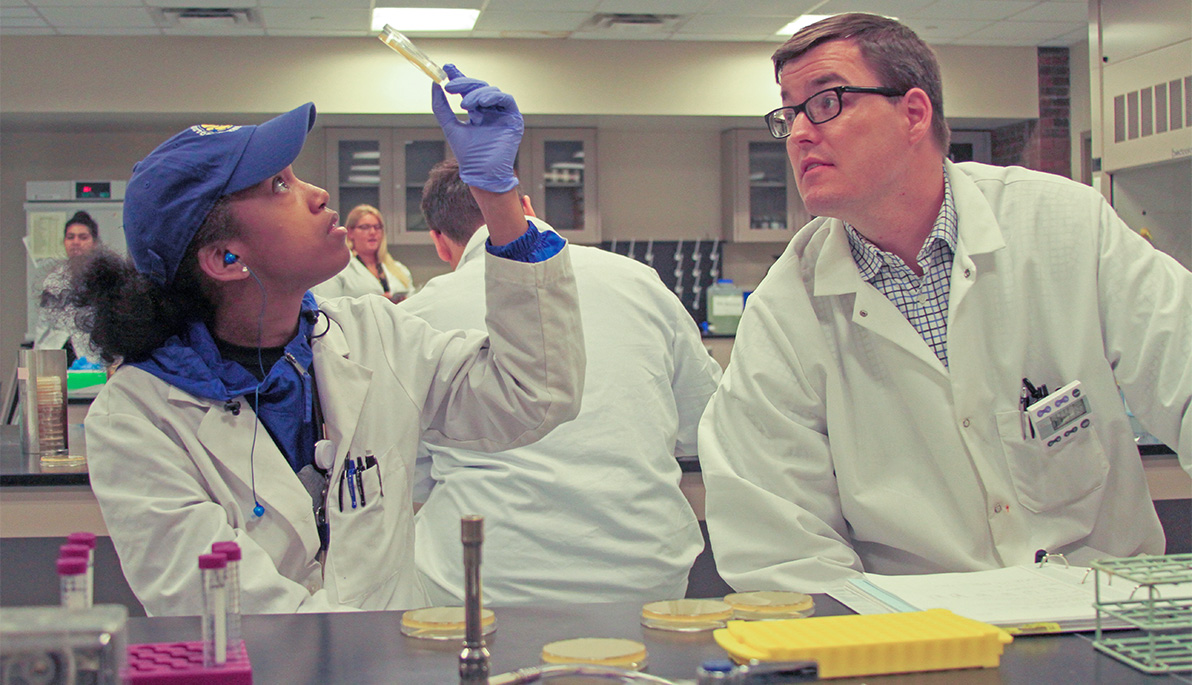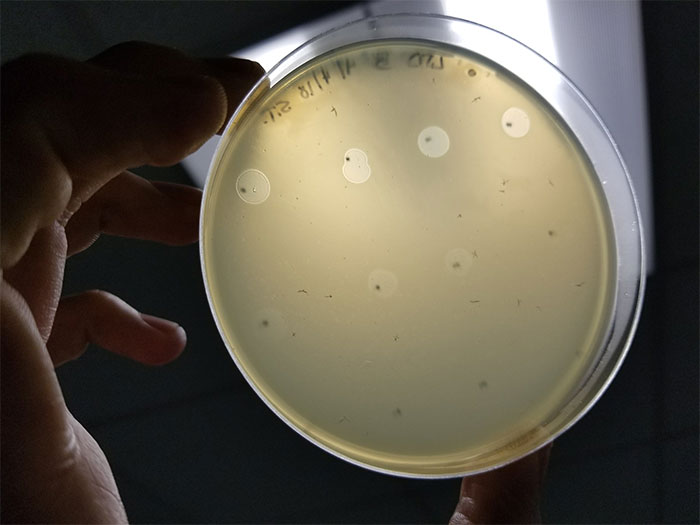
Hunting for Bacteriophages in the Kitchen Sink
June 28, 2018
Pictured: Assistant Professor Bryan Gibb, Ph.D., and a student extract bacteriophages in the lab.
The kitchen sponge. Most people use one every day, despite the knowledge that sponges often harbor more germs and bacteria than they wash away. Yet, this petri dish of household convenience could provide answers to the growing concern about antibiotic resistance. More and more, researchers like molecular biologist Bryan Gibb, Ph.D., assistant professor of life sciences at NYIT College of Arts and Sciences, are pushing for alternative means to fight bacterial infections. Focusing on bacteriophages, Gibb recently enlisted undergraduate students to experiment with kitchen sponges in order to find and determine bacteriophages’ ability to target microbes.
Bacteriophages—viruses that naturally infect bacteria—were discovered in the early 1900s and have been used therapeutically in the former Soviet Union and Central Europe for more than 90 years. “In the West, this is kind of a lost art that’s gaining some new traction,” says Gibb. “Right now, the FDA process for approving drugs is not equipped to deal with a bacterial agent such as the bacteriophage.”

Associate Professor Bryan Gibb, Ph.D., and a team of undergraduates searched for bacteriophages that infect bacteria collected from an ordinary kitchen sponge. The plates show plaques, areas of clearing that are caused when bacteriophages infect and kill bacteria growing on the plate. The bacteria give the plate a hazy appearance and the plaque is clear.
But bacteriophages provide fertile ground for exploration. There are more bacteriophages on the planet than any form of life, and bacteriophages can be found to attack any form of bacteria. This spring semester, the seven students in Gibb’s independent research course are working with bacteria pulled from their own kitchen sponges. “They are in the process of trying to isolate bacteriophages,” Gibb explains. “Once phages are found, there’s a number of things we can do to characterize them, and presumably most of them should be novel.”
Gibb joined NYIT in 2015, attracted in part for the ability to engage undergraduates in scientific research. “I want to get them using the scientific method as early in their career as possible,” he says. “The phage projects are scalable, so I can easily bring in students with no experience and engage them in actual research, while also providing a rich experience for the more experienced students who are ready to go off to grad school.”
This semester’s project is a small piece of a much larger puzzle. Any results will be followed up in subsequent semesters with more detailed investigations of identified bacteriophages as well as “phage hunting” from other sources. “The long-term goals are to learn new things about the biology of non-model bacteriophage systems and identify candidate bacteriophages with therapeutic potential,” Gibb says. So for those worried about antibiotic resistant bacteria, remember, the antidote might just be on an undergraduate’s kitchen sink.
This story originally appeared as part of the feature “Bio + Tech = a Healthier Future“ in the Summer 2018 issue of NYIT Magazine.
.jpg)
Two students in Assistant Professor Bryan Gibb’s independent research class prepare culture plates.
By Renée Gearhart Levy
More Features

An Alumnus’ Commitment to the Environment
As an energy management graduate from New York Tech’s Vancouver campus, Jasdeep Gulati (M.S. ’22) is highly invested in educating people about environmental and climate sustainability.

Vancouver Faculty Win University-Sponsored Research Awards in New Program
The new Global Impact Research Grant (GIRG) program has been developed to keep Vancouver-based faculty connected to faculty and research projects being conducted on the university’s New York campuses.

Studying Climate Change One Degree at a Time
Junhua Qu (M.S. ’24) began her collegiate journey in Beijing. But, her interest in climate change took her to New York Tech’s Vancouver campus to study energy management.